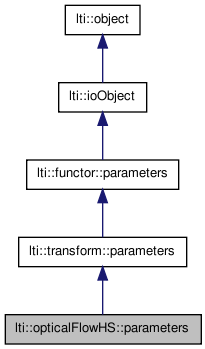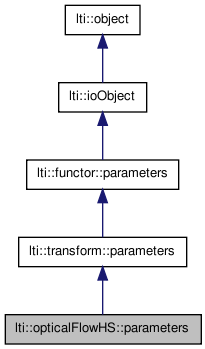

|
latest version v1.9 - last update 10 Apr 2010 |
|
the parameters for the class opticalFlowHS More...
#include <ltiOpticalFlowHS.h>


Public Member Functions | |
| parameters () | |
| parameters (const parameters &other) | |
| ~parameters () | |
| const char * | getTypeName () const |
| parameters & | copy (const parameters &other) |
| virtual functor::parameters * | clone () const |
Public Attributes | |
| int | kernelSize |
| int | iterations |
| float | lambda |
| bool | multiScale |
| bool | initialize |
the parameters for the class opticalFlowHS
| lti::opticalFlowHS::parameters::parameters | ( | ) |
default constructor
Reimplemented from lti::transform::parameters.
| lti::opticalFlowHS::parameters::parameters | ( | const parameters & | other | ) |
copy constructor
| other | the parameters object to be copied |
Reimplemented from lti::transform::parameters.
| lti::opticalFlowHS::parameters::~parameters | ( | ) | [virtual] |
destructor
Reimplemented from lti::functor::parameters.
| virtual functor::parameters* lti::opticalFlowHS::parameters::clone | ( | ) | const [virtual] |
returns a pointer to a clone of the parameters
Reimplemented from lti::transform::parameters.
| parameters& lti::opticalFlowHS::parameters::copy | ( | const parameters & | other | ) |
copy the contents of a parameters object
| other | the parameters object to be copied |
Reimplemented from lti::transform::parameters.
| const char* lti::opticalFlowHS::parameters::getTypeName | ( | ) | const [virtual] |
returns name of this type
Reimplemented from lti::transform::parameters.
If you want to hand over previously calculated flow results (u,v) as initial values of iterative flow computation, then this must be set to 'true'.
Otherwise initial values will always be 0. (default = false) Remark: previous results must be passed as function parameters with the 'on copy apply'. (u,v) must be equal sized to input channels ch_t0, ch_t1, or else they will be ignored.
Number of iterations.
iterations = 1,2,... (default=100)
Size of kernel for spatial gradient computation.
kernelSize = 3,4,5 (default=3)
Smoothness constraint factor.
lambda > 0.0 (default = 10.0)
The solutions (u,v) of the optical flow equation are ambiguous. The additional "smoothness-constraint" allows to select a solution conditional on the desired smoothness of the flowfield. Smoothness is controlled by parameter 'lambda'. Higher values produce smoother flowfields but also higher error e.
Toggles multi scale approach for computation of optical flow.
(default = true)
If multiScale==true, then the two input images are sampled down to several scale levels, before the optical flow is computed iteratively from coarse to fine resolution. This approach allows faster computation and can cope with large motion. Remark: The number of scale levels can vary, since it depends on the number of iterations and the original image size.